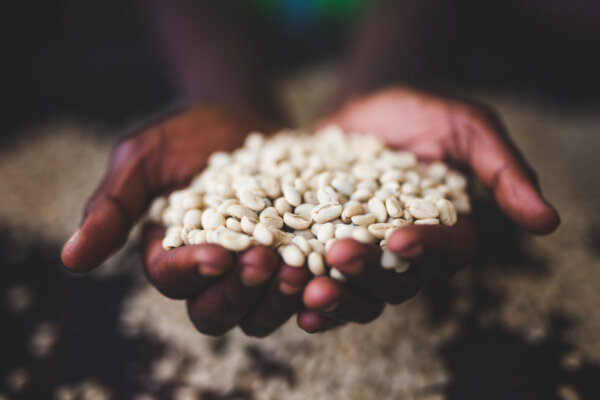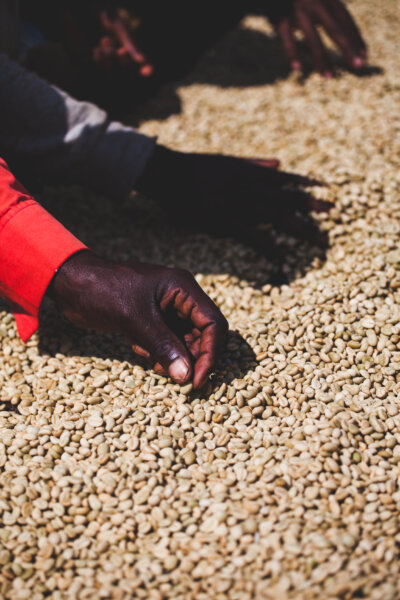About Aleta Wondo

 Ethiopia’s Sidamo region is one of the best-known coffee-growing areas in the world. Like the rest of Ethiopia, it’s divided into several woredas (districts) and kebeles (communities) with washing stations throughout—each offering unique terroir. The Aleta Wondo woreda is one of them, and within it lies the Kura kebele.
Ethiopia’s Sidamo region is one of the best-known coffee-growing areas in the world. Like the rest of Ethiopia, it’s divided into several woredas (districts) and kebeles (communities) with washing stations throughout—each offering unique terroir. The Aleta Wondo woreda is one of them, and within it lies the Kura kebele.
To get to Aleta Wondo we have to fly to the capital of Ethiopia, Addis Ababa, then take a local flight to Hawassa. We drive 2 hours from there to reach Aleta Wondo, where we find the central washing station for the community.
The kebeles that make up Aleta Wondo lie throughout the mountains along access roads. Farmers are about an hour whether by truck or on foot from Kura to the washing station.
The main income source for Kura producers is coffee, which they grow on very small farms ranging from 0.1 to 2 hectares. They intercrop with false banana trees for shade. In this area, fertilization is nearly non-existent.
In the Aleta Wondo washing station, the coffees are fermented for 48 to 72 hours, depending on climate. The typical temperatures in this area used to reach as low as 32 F at night and 77 F during the day, but in recent years the climate has been rising to reaching 59 F at night and 86 F during the day. This has brought fermentation times increasingly closer to 48 hours than to 72 hours. After fermentation, coffee is dried for 15 to 21 days on solar beds, with frequent turning for even drying.
The people of Kura belong to the Sidamo culture and speak various dialects of the Sidamo language. They maintain ancient traditions, like their round housing structures which are identical to those used in this area 10,000 years ago, or family campfire gatherings at the end of each day. Many of the families in the area do not have electricity or clean water, so the local rivers are their main water source. Kura producers are near the forest and have retained many of the original indigenous coffee varieties, which bring the heat with small beans and intense, diverse flavor.
Until a few years ago, the people of Aleta Wondo used to grow only coffee and subsistence crops, but due to low or unreliable coffee prices and the high care needs that come with them, many in the area began to replace coffee with eucalyptus and khat (a commonly used stimulant in Africa). Unfortunately, these crops are harmful to the environment due to their large consumption of water, which depletes the water table. Coffee, on the other hand, is native to the forests of Ethiopia and can have a forest-protective effect.
Much of the traditional coffee-specific knowledge is being lost as coffee cultivation becomes marginalized for khat and eucalyptus. These newer, non-native crops grow independently and don’t need the same kind of agricultural management coffee requires, despite their disruption of the native environment. That ease is attractive and profitable for the young people of the area, who often end up replacing all the coffee on their farms if they aren’t selling their farms entirely.
There are still producers in Aleta Wondo who value coffee and want to preserve their ancient agricultural knowledge for generations to come. Those in the area who want to persevere in coffee find enthusiastic buyers for their elite product at Red Fox. This market access is crucial for the survival of coffee in Bensa and probably one of the few factors that limits the destructive production of khat and eucalyptus in the area.



 Ethiopia’s Sidamo region is one of the best-known coffee-growing areas in the world. Like the rest of Ethiopia, it’s divided into several woredas (districts) and kebeles (communities) with washing stations throughout—each offering unique terroir. The Aleta Wondo woreda is one of them, and within it lies the Kura kebele.
Ethiopia’s Sidamo region is one of the best-known coffee-growing areas in the world. Like the rest of Ethiopia, it’s divided into several woredas (districts) and kebeles (communities) with washing stations throughout—each offering unique terroir. The Aleta Wondo woreda is one of them, and within it lies the Kura kebele.